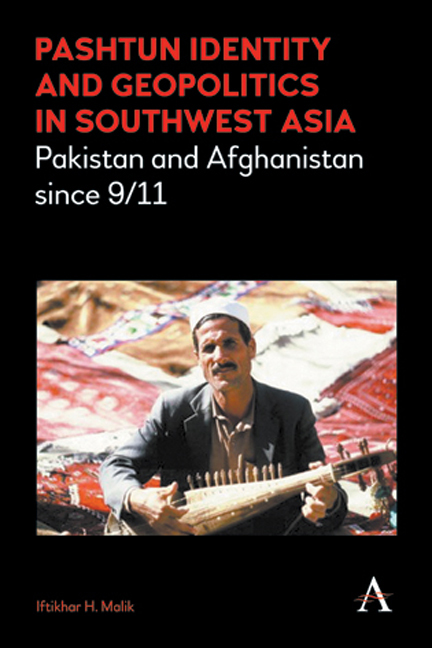Book contents
- Frontmatter
- Contents
- Preface
- Acronyms
- Glossary
- Maps
- Introduction
- Chapter One Gandhara Lands: Wrestling with Pashtun Identity and History
- Chapter Two Imperial Hubris: The Afghan Taliban in Ascendance
- Chapter Three Masculinities in Conflict: Western Pedagogy and the Return of the Afghan Taliban
- Chapter Four Understanding Pakistan: Geopolitical Legacies and Perspectives on Violence
- Chapter Five Understanding Civic Sentiments and Movements in Pakistan: Stalemated Cycle, or a Way Forward?
- Chapter Six The United States and Pakistan: Friends or Foes!
- Chapter Seven The European Union and Southwest Asia: Perceptions, Policies and Permutations
- Conclusion: Pashtun Troubled Lands, Uncertain Southwest Asia or a New Beginning!
- Notes
- Bibliography
- Index
Chapter Six - The United States and Pakistan: Friends or Foes!
Published online by Cambridge University Press: 22 July 2017
- Frontmatter
- Contents
- Preface
- Acronyms
- Glossary
- Maps
- Introduction
- Chapter One Gandhara Lands: Wrestling with Pashtun Identity and History
- Chapter Two Imperial Hubris: The Afghan Taliban in Ascendance
- Chapter Three Masculinities in Conflict: Western Pedagogy and the Return of the Afghan Taliban
- Chapter Four Understanding Pakistan: Geopolitical Legacies and Perspectives on Violence
- Chapter Five Understanding Civic Sentiments and Movements in Pakistan: Stalemated Cycle, or a Way Forward?
- Chapter Six The United States and Pakistan: Friends or Foes!
- Chapter Seven The European Union and Southwest Asia: Perceptions, Policies and Permutations
- Conclusion: Pashtun Troubled Lands, Uncertain Southwest Asia or a New Beginning!
- Notes
- Bibliography
- Index
Summary
‘You are so cheap […] we can buy you with a visa, with a visit to the US, even with a dinner […] we can buy anyone.’
A US spy to Shuja Pasha, the former ISI chief, in the report by Pakistan's Abbottabad Commission‘But the C.I.A. continues to run America's secret air war in Pakistan, where Mr. Kerry's comments underscored the administration's haphazard approach to discussing these issues publicly. During a television interview in Pakistan on Thursday [1 August, 2013], Mr. Kerry said the United States had a “timeline” to end drone strikes in that country's western mountains, adding, “We hope it's going to be very, very soon.”
‘But the Obama administration is expected to carry out drone strikes in Pakistan well into the future. Hours after Mr. Kerry's interview, the State Department issued a statement saying there was no definite timetable to end the targeted killing program in Pakistan, and a department spokeswoman, Marie Harf, said, “In no way would we ever deprive ourselves of a tool to fight a threat if it arises.”’
Mark Mazzetti and Mark LandlerBy 2014, the Afghan war being fought by the United States in collaboration with Canada, Australia, Japan and several other European nations had already become the longest military involvement in American history, and during its second phase rather assumed the uncharitable title of ‘Obama's war’. For many critics, it may be the third Vietnam in recent history following the earlier United States-Vietnam conflagration and the Soviet entanglement in Afghanistan in the 1980s – often called Moscow's Vietnam by many observers, including Zbigniew Brzezinski. In fact, by 2013 a continuously restive Afghanistan had already become the biggest security challenge to the United States with its serious and ever-expansive implications for Southwest Asian nations such as Pakistan and beyond. The former National Security Advisor, in his inaugural lecture at a conference in Dallas in 2009, had vocally highlighted the dangers of Washington's ongoing policies in a country where people were fiercely independent and religiously motivated, and given their terrain and past history determined to fight foreign forces on their soil.
- Type
- Chapter
- Information
- Pashtun Identity and Geopolitics in Southwest Asia , pp. 103 - 114Publisher: Anthem PressPrint publication year: 2016



